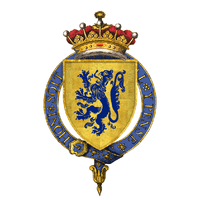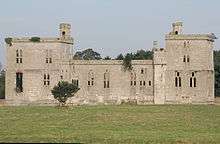Thomas Percy, 1st Earl of Worcester
Thomas Percy, 1st Earl of Worcester, KG (1343 – 23 July 1403) was an English medieval nobleman and naval commander best known for leading the rebellion with his nephew Henry Percy, known as 'Harry Hotspur', and his elder brother, Henry Percy, 1st Earl of Northumberland.


Lineage
He was the younger son of Henry de Percy, 3rd Baron Percy, and Mary, daughter of Henry, 3rd Earl of Lancaster, who descended from Henry III of England.
High offices
Worcester fought against England's traditional enemy France in the Hundred Years' War, and then served in various important governing posts in English-controlled France, as Ambassador, Seneschal. He was appointed Admiral of the North from 26 Jan 1384–22 February 1385. He was created Earl of Worcester in 1397 by King Richard II. In 1399 he was appointed Admiral of the Kings Fleet in Ireland.
Close to the crown
Along with his brother and nephew, he took part in Henry IV's deposition of Richard II, and later, in turn, in their own subsequent rebellion against King Henry IV.
Capture and execution
He was captured at the Battle of Shrewsbury and publicly beheaded in Shrewsbury two days later, on 23 July 1403. He was buried in St. Peter's, Shrewsbury, Shropshire, England. His head was displayed in London on London Bridge.
Fictional portrayals
Of favour from myself and all our House;
And yet I must remember you, my lord,
We were the first and dearest of your friends.
For you my staff of office did I break
In Richard's time; and posted day and night
To meet you on the way, and kiss your hand,
When yet you were in place and in account
Nothing so strong and fortunate as I.
It was myself, my brother, and his son,
That brought you home, and boldly did outdare
The dangers of the time. You swore to us,—
And you did swear that oath at Doncaster,—
That you did nothing purpose 'gainst the state;
Nor claim no further than your new-fall'n right,
The seat of Gaunt, dukedom of Lancaster:
To this we swore our aid. But in short space
It rain'd down fortune showering on your head;
Such a flood of greatness fell on you,—
What with our help, what with the absent King,
What with the injuries of a wanton time,
The seeming sufferances that you had borne,
And the contrarious winds that held the King
So long in his unlucky Irish wars
That all in England did repute him dead,—
And, from this swarm of fair advantages,
You took occasion to be quickly woo'd
To gripe the general sway into your hand;
Forgot your oath to us at Doncaster;
And, being fed by us, you used us so
As that ungentle gull, the cuckoo-bird,
Useth the sparrow; did oppress our nest;
Grew by our feeding to so great a bulk,
That even our love thirst not come near your sight
For fear of swallowing; but with nimble wing
We were enforced, for safety-sake, to fly
Out of your sight, and raise this present head:
Whereby we stand opposed by such means
As you yourself have forged against yourself,
By unkind usage, dangerous countenance,
And violation of all faith and troth
He appears in Shakespeare's Henry IV, Part 1 as a rebel leader.
Ancestry
| Ancestors of Thomas Percy, 1st Earl of Worcester | ||||||||||||||||||||||||||||||||||||||||||||||||||||||||||||||||||||||||||||||||||||||||||||||||||||||||||||||||||||||||||||||||||||||||||||||||||||||||||||||||||||||||||||||||||||||||||||||||||||||||||||||||||||||||||||||||||||||||||||||||||||||||||||||||||||||||||||||||||||||||||||||||||||||||||||||||||||||||||||||||||||||||||||||||||||||||||||||||||||||||||||||||||||||||||||||||||||||||||||||||||||||||||||||||||||||||||||||||||||||||||||||||||||||||||||||||||||||||||||||||||||||||||||||||||||||||||||||||||||||||||||||||||||||||||||||||||||||||||||||||||||||||||||||||||||||||||||||||
|---|---|---|---|---|---|---|---|---|---|---|---|---|---|---|---|---|---|---|---|---|---|---|---|---|---|---|---|---|---|---|---|---|---|---|---|---|---|---|---|---|---|---|---|---|---|---|---|---|---|---|---|---|---|---|---|---|---|---|---|---|---|---|---|---|---|---|---|---|---|---|---|---|---|---|---|---|---|---|---|---|---|---|---|---|---|---|---|---|---|---|---|---|---|---|---|---|---|---|---|---|---|---|---|---|---|---|---|---|---|---|---|---|---|---|---|---|---|---|---|---|---|---|---|---|---|---|---|---|---|---|---|---|---|---|---|---|---|---|---|---|---|---|---|---|---|---|---|---|---|---|---|---|---|---|---|---|---|---|---|---|---|---|---|---|---|---|---|---|---|---|---|---|---|---|---|---|---|---|---|---|---|---|---|---|---|---|---|---|---|---|---|---|---|---|---|---|---|---|---|---|---|---|---|---|---|---|---|---|---|---|---|---|---|---|---|---|---|---|---|---|---|---|---|---|---|---|---|---|---|---|---|---|---|---|---|---|---|---|---|---|---|---|---|---|---|---|---|---|---|---|---|---|---|---|---|---|---|---|---|---|---|---|---|---|---|---|---|---|---|---|---|---|---|---|---|---|---|---|---|---|---|---|---|---|---|---|---|---|---|---|---|---|---|---|---|---|---|---|---|---|---|---|---|---|---|---|---|---|---|---|---|---|---|---|---|---|---|---|---|---|---|---|---|---|---|---|---|---|---|---|---|---|---|---|---|---|---|---|---|---|---|---|---|---|---|---|---|---|---|---|---|---|---|---|---|---|---|---|---|---|---|---|---|---|---|---|---|---|---|---|---|---|---|---|---|---|---|---|---|---|---|---|---|---|---|---|---|---|---|---|---|---|---|---|---|---|---|---|---|---|---|---|---|---|---|---|---|---|---|---|---|---|---|---|---|---|---|---|---|---|---|---|---|---|---|---|---|---|---|---|---|---|---|---|---|---|---|---|---|---|---|---|---|---|---|---|---|---|---|---|---|---|---|---|---|---|---|---|---|---|---|---|---|---|---|---|---|---|---|---|---|---|---|---|---|---|---|---|---|---|---|---|---|---|---|---|---|---|---|---|---|---|---|---|---|---|---|---|---|---|---|---|---|---|---|---|---|---|---|---|---|---|---|---|---|---|---|---|---|---|---|---|---|---|---|---|---|---|---|---|---|---|---|---|---|---|---|---|---|---|---|---|---|---|---|---|---|---|---|---|---|---|---|---|---|---|---|---|---|---|---|---|---|---|---|---|---|---|---|---|---|---|---|---|---|---|---|---|---|---|---|---|---|---|---|---|---|---|---|---|---|---|
| ||||||||||||||||||||||||||||||||||||||||||||||||||||||||||||||||||||||||||||||||||||||||||||||||||||||||||||||||||||||||||||||||||||||||||||||||||||||||||||||||||||||||||||||||||||||||||||||||||||||||||||||||||||||||||||||||||||||||||||||||||||||||||||||||||||||||||||||||||||||||||||||||||||||||||||||||||||||||||||||||||||||||||||||||||||||||||||||||||||||||||||||||||||||||||||||||||||||||||||||||||||||||||||||||||||||||||||||||||||||||||||||||||||||||||||||||||||||||||||||||||||||||||||||||||||||||||||||||||||||||||||||||||||||||||||||||||||||||||||||||||||||||||||||||||||||||||||||||
References
- Emery 1996, p. 417
- Lee, Sidney, ed. (1895). . Dictionary of National Biography. 44. London: Smith, Elder & Co.
- Emery, Anthony (1996), Greater Medieval Houses of England and Wales: Volume I Northern England, Cambridge University Press, ISBN 9780521497237
- Chisholm, Hugh, ed. (1911). . Encyclopædia Britannica. 28 (11th ed.). Cambridge University Press. p. 820.
| Peerage of England | ||
|---|---|---|
| Preceded by New Creation |
Earl of Worcester 1397–1403 |
Succeeded by Extinct |